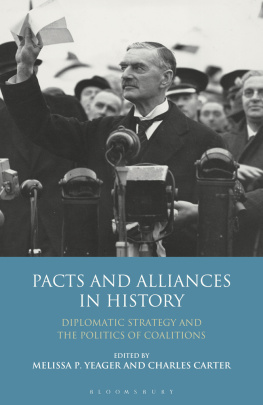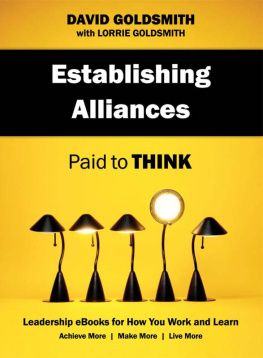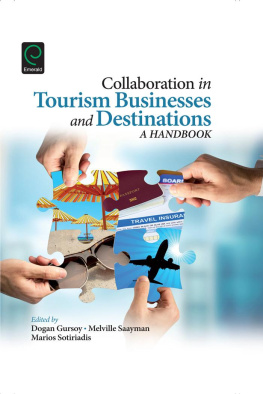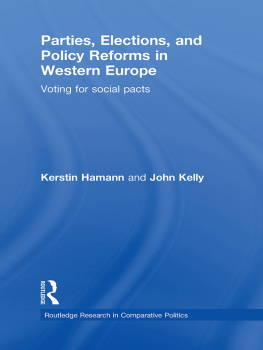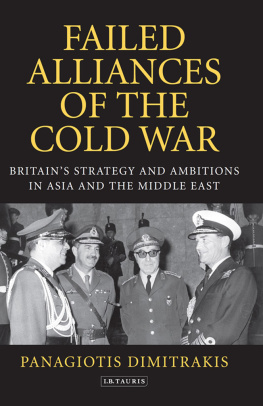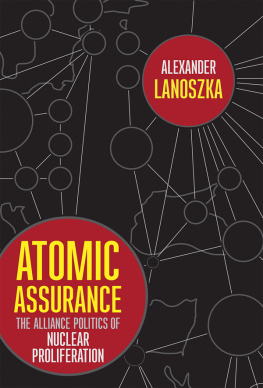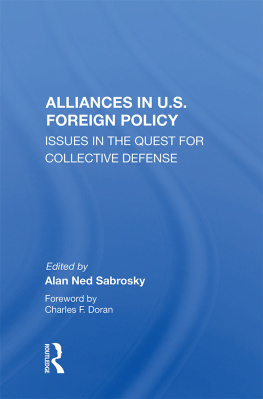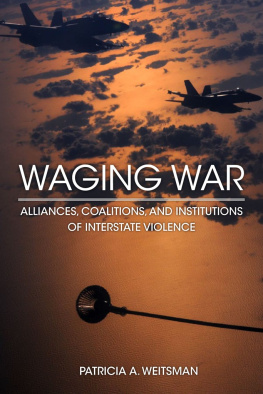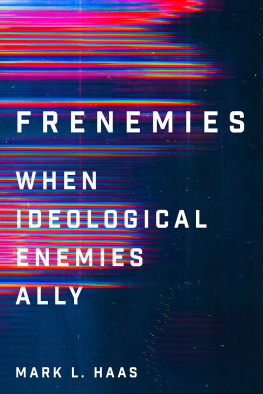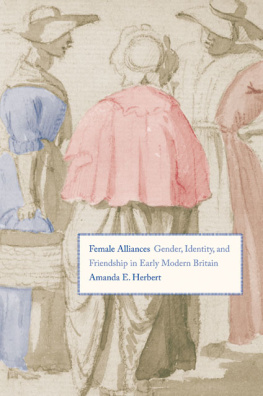Melissa P. Yeager is Assistant Professor of European History at Longwood University, Virginia and holds a DPhil from Oxford University.
Charles Carter is Reader in History at Ohio State University.
PACTS AND ALLIANCES IN HISTORY
Diplomatic Strategy and the Politics of Coalitions
MELISSA P. YEAGER AND CHARLES CARTER
CONTENTS
Charles Carter
William Stueck
Jean-Bertrand Ribat
James C. Helicke
Mark Rice
Kathleen Burk
Michael McKoy
Teddy J. Uldricks
Melissa P. Yeager
Yasser El-Shimy
Melissa P. Yeager and Michael McKoy
ACKNOWLEDGMENTS
The editors would like to thank the Mershon Center for International Security Studies at the Ohio State University for supporting the conference that led to this volume and for further supporting its production. Tony Crain, James C. Helicke, Ann Powers, Carole Fink, and Peter Hahn were integral to the project. We owe much gratitude to Shannon D. Lindbloom for sterling copy-editing. Melissa would also like to thank David Graeme Yeager, who was born at the same time as this project, for napping sufficiently to enable its completion.
ABOUT THE CONTRIBUTORS
Kathleen Burk is Professor of Modern and Contemporary History at University College London (UCL). The author or co-author of seven books and the editor of four, she specialises in Anglo-American relations and on finance and foreign policy. She also writes on wine.
Charles Carter is a Ph.D. candidate in European History at the Ohio State University. His areas of specialization include the Cold War, GermanSoviet relations, and business history. His dissertation examines West German trade with the Soviet Union (Osthandel) from 1969 to 1991 and argues that this commercial relationship had a deleterious effect on the USSR economy. He received his B.A. and M.A. from the University of Georgia.
Yasser El-Shimy is a Political Science doctoral candidate at Boston University, and a former diplomatic attach at the Egyptian Ministry of Foreign Affairs. Mr. El-Shimy earned his B.A. and M.A. in Political Science from the American University in Cairo. He currently resides in Washington D.C. where he lectures part-time at the Catholic University of America. His blog, Underreported, can be found at: http://el-shimy.blogspot.com.
James C. Helicke is a Ph.D. candidate in International History at the Ohio State University and holds an M.A. from Bilkent University in Ankara, Turkey. Helicke was formerly a correspondent for the Associated Press based in Turkey and also served as a Public Diplomacy Officer for the U.S. Department of State in the Kurdistan region of Iraq. He is managing editor for the online history magazine, Origins: Current Events in Historical Perspective.
Michael McKoy is a Ph.D. candidate in the Politics Department at Princeton University, studying International Relations. His research focuses on the international causes and effects of forceful government overthrow. He has received fellowships from the Bradley Foundation and the Princeton Institute for International and Regional Studies.
Jean-Bertrand Ribat graduated from the Ecoles Prparatoires aux Hautes Etudes de Commerce (prpa HEC), followed by the Ecole Superieure de Commerce de Bordeaux. He was a manager for almost twenty years and a specialist in outdoor expeditions, before going to the United States to study at Columbia University and the University of Montana-Missoula. He is currently in the Political Science department at Indiana University (Bloomington) finishing his Ph.D. dissertation on the management of coalitions.
Mark Rice holds a doctoral degree in history from the Ohio State University, with a field in diplomatic and international history. His dissertation is entitled The Alliance City: NATO and Berlin, 19581963. Before beginning at Ohio State, Mark received his Masters degree from Ohio University, through the Contemporary History Institute, and his Bachelor of Arts (Honours) from the University of Toronto. He is currently an instructor at Minnesota State University, Mankato.
William Stueck has written extensively on the Korean War and U.S.Korean relations. He is currently a distinguished research professor of history at the University of Georgia.
Teddy J. Uldricks is Professor of History at the University of North Carolina at Asheville. He is currently completing Global Conflict: An Interpretive History of the Second World War.
Melissa P. Yeager is Assistant Professor in European History at Longwood University in Virginia. She has published (previously under the name Melissa Pine) on Harold Wilson, Britain and European integration, British, French and American nuclear collaboration, history and theory.
INTRODUCTION
Charles Carter
Pacts and alliances have been a prominent feature of international relations for centuries, and especially since the time of Napoleon. Diplomats and officials consistently have believed that these structures, in some form or another, are necessary for the preservation of order and stability in any given society. Indeed, diplomacy itself presupposes two or more nations joining forces from time to time to combat or ward off a perceived threat, whether real or illusory, despite conflicting evidence about whether alliances prevent or encourage conflict. Yet at its most basic level, pact-making is not always a calculated political, military, or strategic move but often a social activity, the presence of which has existed in all nations, from the most primitive city-states to the most advanced superpowers. From the time when kings threw feasts as they gave their daughters in marriage to solidify an alliance, to the grand ceremonies of today in which representatives from member nations of the North Atlantic Treaty Organisation (NATO) toast one another, transnational bonds have been formed through alliances. Given the perceived necessity of alliances among officials, together with the social features inherent in pact-making, there is little reason to imagine that the creation of pacts and alliances will ever be an obsolete process.
At the same time, history has not smiled favorably on the perseverance of pacts and alliances over time. As the political, strategic, military, economic, or cultural objectives of nations have changed, nations have formed new relationships on the international scene, a process which almost always has culminated in the breaking of old and making of new pacts. Domestic politics have also played an important role in the maintenance and disintegration of alliances. Although the Quadruple Alliance against Napoleon set the example for a strong European alliance, for example, the Holy Alliance of Austria, Russia, and Prussia failed to address domestic impulses for liberal change and, in the process, undermined the lasting peace that the Quadruple Alliance had helped produce. Additionally, a change in leadership often has been a central issue that has determined whether a pact or alliance will continue or end. A master of balance-of-power politics, Germanys Bismarck made sure he did not anger England excessively by intensively building up his countrys navy, and he secured a Reinsurance treaty with Russia. Yet an insecure and militant Wilhelm II not only antagonized Britain through naval development but also discarded the treaty with Russia and, in doing so, set the stage for deep antipathy between Tsarist Russia and Germany, no doubt a prerequisite for the First World War.

